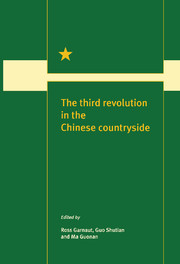Book contents
- Frontmatter
- Contents
- Figures
- Maps
- Tables
- Contributors
- Preface
- 1 The third revolution
- Feeding the people
- 2 Success in early reform: setting the stage
- 3 Completing the third revolution
- 4 China's grain demand: recent experience and prospects to the year 2000
- 5 Rural poverty in post-reform China
- Marketing and price reform
- Internationalisation
- Regional issues
- Institutional change
- References
- Index
2 - Success in early reform: setting the stage
from Feeding the people
Published online by Cambridge University Press: 04 August 2010
- Frontmatter
- Contents
- Figures
- Maps
- Tables
- Contributors
- Preface
- 1 The third revolution
- Feeding the people
- 2 Success in early reform: setting the stage
- 3 Completing the third revolution
- 4 China's grain demand: recent experience and prospects to the year 2000
- 5 Rural poverty in post-reform China
- Marketing and price reform
- Internationalisation
- Regional issues
- Institutional change
- References
- Index
Summary
One of China's most remarkable achievements in the reform era has been its rapid agricultural growth. The initial success of reforms in agriculture, especially the remarkable growth of grain output, greatly encouraged China's political leaders. As a result, a series of more far-reaching reforms was initiated in 1984 in both urban and rural areas. Between 1978 and 1984 the value of agricultural output grew at a rate of 7.4 per cent annually, and grain output at 4.8 per cent. Both rates exceeded by a wide margin those achieved in the previous 26 years, 2.9 and 2.4 per cent, respectively. Compared with the era preceeding reform, the growth in the availability of agricultural products in the early 1980s was truly exceptional. Meanwhile, the population growth rate dropped from an average of 2.0 per cent per year before reform to 1.4 per cent in the 1980s.
Agriculture as a whole continued to grow at a respectable average rate of 4 per cent per year but grain production stagnated after reaching a peak of 407 million tons in 1984, and did not again reach this level until 1989. As grain production is given strategic importance in China's politics, the optimism that robust agricultural development generated during the first five years of rural reforms was swiftly replaced by pessimism. The desirability of instituting the household-based farming system was questioned by some in government and academic circles, and a call even emerged for recollectivisation.
- Type
- Chapter
- Information
- The Third Revolution in the Chinese Countryside , pp. 13 - 26Publisher: Cambridge University PressPrint publication year: 1996
- 15
- Cited by



